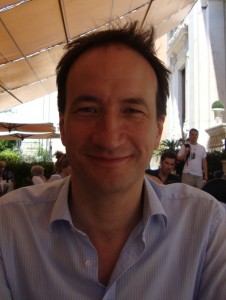257. Martin Pickavé on Henry of Ghent and Freedom
An interview with Martin Pickavé on voluntarism and the interaction of will and intellect, according to Henry of Ghent.
Themes:
Prof Pickavé's website.
• Henry of Ghent and John Duns Scotus on Skepticism and the Possibility of Naturally Acquired Knowledge”, in Henrik Lagerlund (ed.), Rethinking the History of Skepticism: The Missing Medieval Background (Leiden: 2010), 61-96.
• “Henry of Ghent on Metaphysics”, in Gordon Wilson (ed.), A Companion to Henry of Ghent (Leiden: 2010), 153-179.
• “Henry of Ghent on Individuation, Essence, and Being”, in Wilson (ed.), A Companion to Henry of Ghent, 181-209.
• Heinrich von Gent über Metaphysik als erste Wissenschaft. Studien zu einem Metaphysikentwurf aus dem letzten Viertel des 13. Jahrhunderts (Leiden: 2007).







Comments
Free Choice
Hi Peter,
Thanks for another great interview, and thanks to Martin Pickave for discussing Henry of Ghent on Freedom!
I thought Martin did well in representing Henry's position on freedom, though I'd add one caveat regarding the obscure case of God the Father and God the Son's voluntary production of God the Holy Spirit. (My D.Phil. (Oxford) was on Henry's Trinitarian Theology.) As Martin pointed out, Henry holds that the Holy Spirit is freely produced, but necessarily. From this Martin inferred that alternative possibilities is not a feature of Henry's account of freedom. This is true. But so far as I understand things, it is not true if we are talking about Henry's account of free choice. Free choice, for Henry, requires alternative possibilities (to will, to nil, or to reject a cognized object). You can find this in Henry's Quodlibet 13, question 11 in which he discusses Anselm at some length and offers his own replies to Giles of Rome on behalf of the view that free choice requires alternative possibilities in the will itself. Of course, Henry concedes that for the exercise of free choice there must be a cognized object, but the will can choose to will the object, nil the object, or reject the object. In a book I'm working on I'll get into the details of Henry on freedom in the case of the voluntary production of the Holy Spirit. I think it is misleading to take this obscure case and put it into the context of Henry's account of free choice. Of course, freedom is involved in the Trinitarian case. It's just that Henry's distinguishing freedom and free choice allow him to claim that the Holy Spirit is necessarily voluntarily produced (i.e. no alt. possibilities), and that creatures with free choice have alt. possibilities in choosing with regard to some cognized object. Later, William of Ockham doesn't buy Henry's distinction between freedom and free choice and so has reason to reject Henry's theological claim that God the Father and God the Son voluntarily produce the Holy Spirit, on the assumption that the Holy Spirit is metaphysically necessary.
Another interesting case is that of the blessed saints in heaven. They are supposed to freely and necessarily enjoy the beatific vision according to theologians like Henry and Duns Scotus. Their solution to this involves an appeal to a distinction between freedom and free choice - though Henry and Scotus differ on the details in such a case.
I am looking forward to the next podcast on the Trinitarian issues! It's a topic I've worked too much on with regard to Henry of Ghent.
Free Will and Randomness
Hello Peter,
I'm having a bit of trouble visualising how Henry sees the will here. This is an objection you mentioned in the podcast but I'm still a bit hazy on it. I'll try to elaborate my confusion with a thought experiment.
Let's say there's a person who goes to lunch. His options are either fish or chicken. He picks chicken. We then repeat the day, over and over, and observe what choice he makes each day. The person has no knowledge that the day is being repeated and all variables are exactly the same each time.
Either the person picks chicken every time, in which case his choice is indistinguishable from the case where everything is casually determined, or he sometimes picks fish, in which case his choice is random (since it does not seem to depend on any reason since all variables are the same) and no choice at all.
Where, exactly, does the will come in? I'm having trouble understanding how we can coherently talk about the will in a manner which makes it neither deterministic nor random.
I feel like saying that there are necessary reasons but no sufficient ones doesn't solve the problem either. At the end, when the will has a host of reasons and must make a choice, either it makes the same final choice everytime (in which case things are deterministic) or it sometimes makes a different choice (in which case things are random).
In reply to Free Will and Randomness by Omar
Will and randomness
Yes, I'm sympathetic with that reaction and it is precisely what a lot of compatibilists would say against modern-day libertarians. One might say that proponents of libertarian freedom have the randomness problem, which mirrors the determinism (lack of freedom) problem facing compatibilists. The libertarian, in this case Henry, can however say that the will is responsive to reasons without saying that it is determined by them. In fact it is (arguably) just an obvious fact that we are sometimes, when we are weak, led by what would seem in the clear light of day to be a weaker reason. This phenomenon of akrasia, or weakness of will, is a strong point in favor of the libertarian.
It may also help to distinguish between the following two questions: "why did you order chicken?" and "why did you order chicken rather than fish?" It might be that there is a very good answer for the first (I like chicken) but not such a good answer for the second (well, I just felt like it). Henry could thus say that being able to give an answer to the first question shows that the choice wasn't just random, the randomness only seems to appear if you start focusing on the second question.
In reply to Will and randomness by Peter Adamson
random and deterministic
I might be a little late (but still I am proud to have reached this episode) and probably won't be of any help either.
When Omar in his reaction to the episode said "talk about the will in a manner which makes it neither deterministic nor random" I think he is following a line of thought that is also reflected in your answer, namely that freedom points to or leads to randomness where determinism doesn't. In my line of work (cryptography) it's all about randomness, but the funny thing is, if you see something that looks random, it isn't necessarily non deterministic (mostly not). Data is considered to be random, i.e. non disguisable for truly random (whatever that me be) when two conditions are met, first, the answers are statistically random (about just as much Yes and No) and secondly, you can't derive the next answer, so if you know answer 3,4 and 5 you can't derive answer 6 nor can you go backwards and figure out what answer 2 has been. Data can have that property and still be deterministic. Going back to free will or not, if you see someone answering questions and the outcome looks totally random (doesn't resemble anything) it can still be fully deterministic, no freedom what so ever.
I am also Dutch and that doesn't make things easier. The Dutch for voluntary (will-e-keurig) has two meanings, voluntary but also accidentally or by change. So if we see something clearly non deterministic, it still doesn't mean that it is voluntary, it could just be accidentally, but we don't know how to say it. I guess you call that double Dutch. There is also a Dutch difference between unvoluntarily (on-will-e-keurig) and simply not voluntarily, but I let's not go there.
In reply to random and deterministic by Erik Holkers
D(e)utsch
That "double Dutch" joke was very good.
The same is true with the German willkürlich.
Add new comment